March 27, 2019
In 1930, five years after its founding, Stanford Graduate School of Business graduated two women, the first in the school’s history. Fast-forward to today: Forty percent of the MBA Class of 2020 are women, and thousands of graduates have used their Stanford GSB education to change lives, change organizations, and change the world.
In honor of Women’s History Month, we highlight a few remarkable alumnae and the most important lessons they’ve taken from the classroom to the C-suite.
Amy Jadesimi: Building a Better, More Sustainable Future
Since 2009, Amy Jadesimi, MBA ’04, has been the CEO of Lagos Deep Offshore Logistics Base, a $500 million industrial free zone in Lagos Harbour, Nigeria, that supports oil exploration off the coast of West Africa. She plans to bring LADOL into new sectors such as car manufacturing and education and is passionate about developing infrastructures that will help African countries become leading global economies.
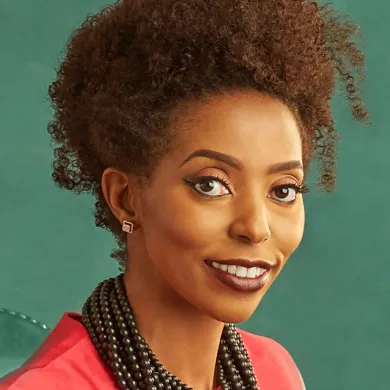
Amy Jadesimi, MBA ’04. | Courtesy of Amy Jadesimi
Jadesimi attended Stanford GSB after studying medicine at Oxford University and working at Goldman Sachs. She then built up LADOL as a local firm, and now manages more than 1,000 Nigerian employees. “I have encountered many setbacks, but that does not divert me from continuing to pursue my goals,” Jadesimi says. “Hard work, consistency, and flexible strategies help. However, the winning factor is teamwork. Working with a strong, committed, diverse team of people is ultimately the best way to achieve success, especially in difficult circumstances.”
Under Jadesimi’s leadership, LADOL has become a trailblazer in sustainability for industrial free zones. “My core belief is that the vast majority of people on the planet want what is best for each other and will choose options that maximize the good for all, such as sustainability. Building a better future based on facts and evidence — which a handful of people try to obscure to maintain what they think is in their narrow and short-term best interests — is what matters most to me.”
Her advice to incoming MBA students is to try as many things as possible, but “before you leave, focus on your core interests, and do a deep dive on that.”
Mary Barra: Seize the Unplanned Opportunities
“Hard work beats talent if talent doesn’t work hard,” says Mary Barra, MBA ’90 and CEO and chairman of General Motors. Barra cites her mother as one of the most inspirational and influential women in her life. “My mother grew up during the Great Depression, and she taught my brother and me two lessons: There is no substitute for hard work, and work before you play,” Barra says.
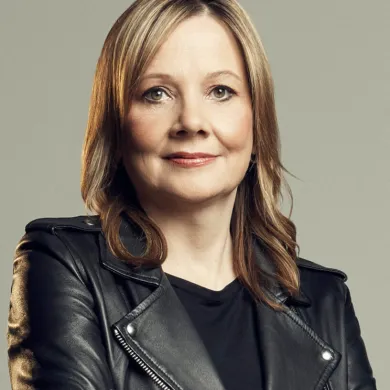
Mary Barra, MBA ’90. | Courtesy of Mary Barra/GM
A native of Michigan and the first female CEO of a major global automaker, Barra sees herself as a champion of both men and women. “When you solve issues for women, you solve issues for everyone, because a lot of the time men have the same issue.”
Barra, who began her career at GM at age 18 and gradually ascended to the top role, urges women entering the workforce to expect the unexpected and to seize unplanned opportunities as they arise: “Don’t limit your potential. Progress does not always travel in a straight line. Each new opportunity will broaden your skills and perspective.”
Ashley Edwards: Speak Your Mind
“Speak your mind, even if your voice shakes” has become a personal mantra for Ashley Edwards, MBA ’16. While Edwards worked at a charter school where 90% of the students lived in poverty, she learned how deeply affected students were by the traumas in their daily lives and how much they needed someone to talk to. Motivated to combat the stigmas around mental health within communities of color, Edwards came to Stanford GSB with a mission to change lives.
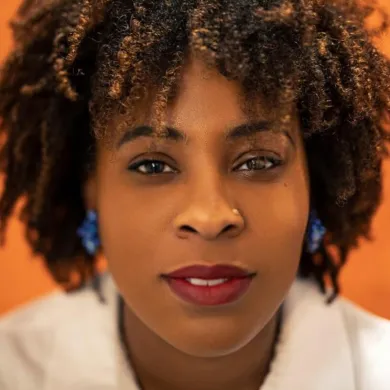
Ashley Edwards, MBA ’16. | Courtesy of Ashley Edwards
She met and teamed up with Alina Liao, MBA ’16, in Startup Garage to cofound MindRight, which provides live coaching through text messages. The tech nonprofit aims not only to help a teen when crisis strikes, but also to be present for an adolescent’s day-to-day life and emotions. Currently, more than 400 teens are enrolled in the program, each matched with coaches they can talk to about whatever is on their minds and find support.
Susan Athey: Helping Others Thrive in the Digital Transformation
Susan Athey, PhD ’95 and the Economics of Technology Professor at Stanford GSB, focuses her research on cutting-edge technologies upending our world. One of the first “tech economists,” her work has spanned economics of digitization, marketplace design, and the intersection of econometrics and machine learning. Athey is inspired, she says, “by a mission to help people, organizations, and academia reach their full potential through a period of digital transformation.”
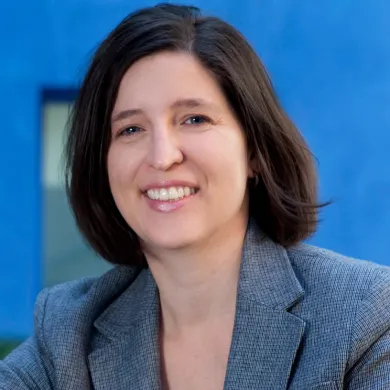
Susan Athey, Economics of Technology Professor. | Courtesy of Susan Athey
“Recent advances in science and technology allow us to build products and services and deliver them to people at scale as never before,” Athey says. “The potential is greater than ever to improve the human condition. At the same time, new and serious risks are emerging related to the same advances, ranging from increased inequality and polarization to surveillance and new forms of warfare.”
Athey, who was the first woman to win the distinguished John Clark Bates Medal, works with start-ups, governments, and NGOs, advising them on market design, platform economics, and innovative technologies.
Athey says her husband, Guido Imbens (the Applied Econometrics Professor and Professor of Economics at Stanford GSB), has been instrumental in her success.
“Without a true partner at home, I could never have taken the opportunities and risks that let my career continue to expand and grow in the 15 years I’ve been a parent,” she says.
Athey advises MBA students to identify their aptitudes to lead through the digital transformation and develop these strengths while at Stanford GSB. In addition, she says, “make sure you have enough fluency with data and technology to be able to think critically about empirical evidence and understand the value as well as the limits of data and algorithms.”
Ciiru Waweru Waithaka: Aiming Beyond the Sky
Six years ago, Ciiru Waweru Waithaka, Stanford Seed Participant ’17, was pregnant with her son when she saw a market opportunity: creating the first children’s brand from Africa. She launched FunKidz Limited, a company that employs locals in Kenya and uses locally sourced materials to create kids’ furniture, products, and educational tools.
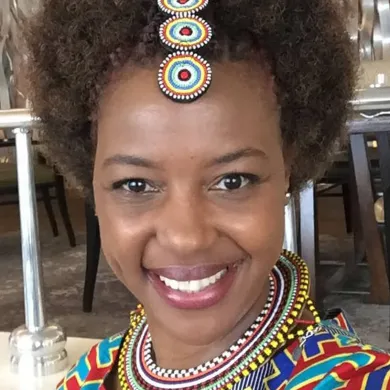
Ciiru Waweru Waithaka, Seed Participant ’17. | Courtesy of Ciiru Wawera Waithaka
Being a natural creative who struggled to find her place in a traditional school where the arts weren’t valued, Waweru Waithaka also creates programs that teach creativity to underprivileged kids. In addition, she travels the world speaking about entrepreneurship and opportunities for women.
“It’s not OK for us to be OK with the world not being OK,” she says. “Each one of us must take responsibility and make the world a better place.”
Waweru Waithaka plans to continue innovating and mentoring other women entrepreneurs: “I hate to hear, ‘The sky’s the limit.’ The sky cannot possibly be the limit, as it is only as far as the eye can see. There is more beyond the sky, and that is where I am aiming.”
Andrea Wong: Find Your Passion and Pursue It with Vigor
Andrea Wong, MBA ’93, spent nearly a decade as president of international production for Sony Pictures Television, overseeing 18 production companies and creating nearly 1,300 hours of entertainment each year. Prior to that, she worked at ABC, developing such hit series as The Bachelor and Dancing with the Stars. Wong currently serves on various boards, including Liberty Media Corporation and Hudson Pacific Properties. She also is a governor of the British Film Institute and a trustee of the Royal Academy of Arts.
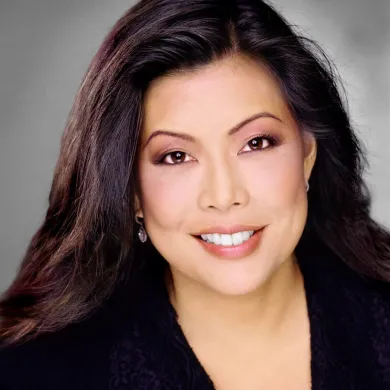
Andrea Wong, MBA ’93. | Courtesy of Andrea Wong
Wong believes a wide range of experiences and people have been pivotal to her success. “What matters to me most at work is being with people I like and respect — constantly learning and being in a situation where I can have an impact,” Wong says.
Looking back at her time as an MBA student, Wong recalls how lessons from the classroom have stayed with her. “Jeffrey Pfeffer, Jack McDonald, and Joel Peterson were each mentors, amazing professors, and guides for me. Although they didn’t necessarily have direct knowledge about the entertainment industry, they had a huge impact on me while I was at Stanford GSB, and well beyond.”
Wong also shared her advice for incoming MBA students: “Figure out what you are passionate about and pursue it with vigor,” she says. “Don’t be afraid to take a step back to take a step forward in moving toward that.”
For media inquiries, visit the Newsroom.



